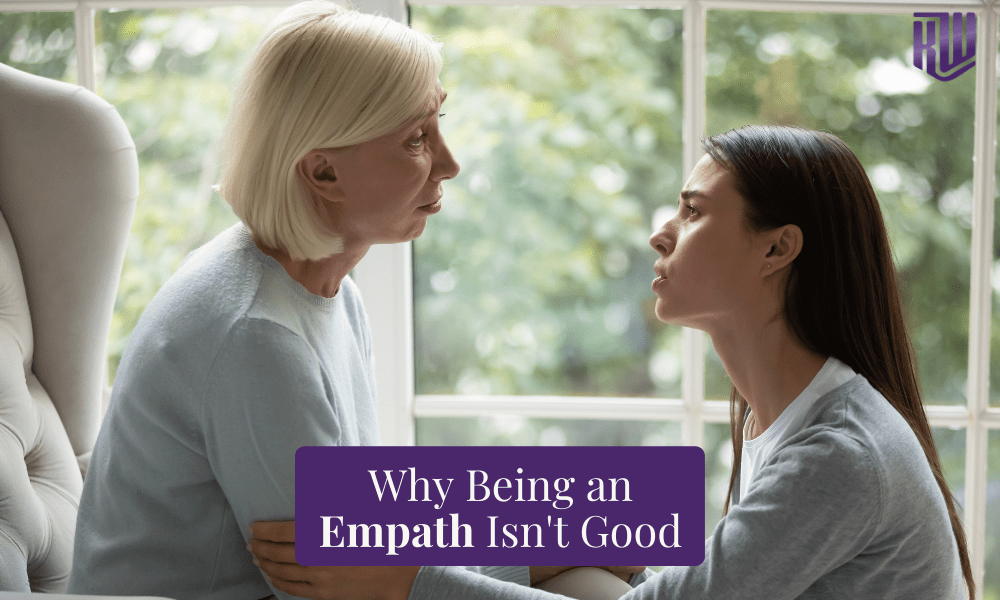Most people believe being an empath is superior, but it can damage your life and relationships. Today’s Best Day Blog article, and the accompanying video, will take you through what an empath is actually experiencing, what creates them, and what you need to do so that you don’t end up in trouble! To do so, we’ll go through the difference between being an empath and empathy, and also the truth about empaths that many experts won’t tell you.
What is the difference between being an empath and empathy?
Empaths absorb other people’s emotions and will often become that person’s emotions, no matter how they feel themselves, altering how they feel inside. Empathy, on the other hand, is the ability to take somebody’s story and equate it to a moment in your life where similar feelings were encountered and put yourself in their shoes, remembering what it was like from your own experience to be going through something similar. Somebody with empathy won’t lose themselves and can stay contained. In contrast, an empath cannot keep that separation between themselves and the other, instead absorbing the feelings as if they were their own.
The experts won’t tell you that being an empath is actually a misnomer for something else. There is a way to prove this – before you continue reading this article, type into Google ‘empath’. Notice the results that come up, many articles on ‘10 characteristics of Empaths’, for example, all of which will say similar things like ‘empaths absorb others emotions, they can become overwhelmed, they have huge hearts but give away too much…etc.’. Now Google the characteristics of a codependent, and you’ll notice that these share the same traits.
Unfortunately, the myth that being an empath makes you better than others and is a desirable trait isn’t correct. An empath is someone who is living with untreated codependency.
Pia Mellody asserts that the main 5 symptoms of codependency are:
- Low self-esteem
- Lack of boundaries
- Lack of self-care
- Out of touch with reality (believing that their overt kindness is healthy and admirable)
- Lack of maturity
This can be difficult to accept, and this information isn’t here to disparage you. In fact, I myself have had to learn and own this part of myself.
The Myth Of, “I Was Born An Empath.”
The tendency to wear being an empath as a badge of honor is most often justified by the phrase, “I was born this way.” No human is cognitively capable of remembering or assessing the feeling state they were born with. The person who claims they were born this way is “out of touch with reality.” They have constructed a reality that is not based on truth—a core symptom of codependency. Emotions and feelings are created and learned through our childhood experiences. We are all born with a certain effect, which is a description of our general state, but emotions and feelings are learned constructions based on the emotional environment and culture in which we were raised.
Becoming someone else as an empath does, who is taken over by the feelings of another, is a perfect imperfection. In many of my videos, I speak about my having a ‘great gift’ of being an empath,. It has taken time for me to work through my codependence and get to the reality that this is not a gift but, instead, one of my many perfect imperfections. This can be difficult to accept and understand, but acceptance is the key to healing.
What Creates the Empath?
There are two things that generally lead to someone becoming an empath.
- Childhood trauma
- Shame
Unfortunately, for many empaths, it might not be immediately obvious what the trauma is. It’s very common to hear people declare that they had a great childhood and, therefore, haven’t experienced trauma. Humans are imperfect, and those imperfections leave emotional wounds. The disconnect is that most think the definition of trauma means they experienced some horrific event. Trauma is any event that leaves a negative emotional condition that persists. You don’t become an empath unless your childhood was filled with some form of emotional dysfunction. Therefore, because we are perfectly imperfect humans, we have all experienced trauma of some sort growing up – there are no exceptions. To not accept this truth is to be out of touch with reality. A core symptom of codependency.
As children, in the first seven years, our brains operate in a theta state, which is a hypnotic state without cognition. Therefore we are extremely open and impressionable. We have no emotional boundaries, so we download and become whatever our parent’s emotional condition is. As we gain understanding, we construct a reality to justify our parent’s imperfections. We condone their perfectly imperfect behavior. In the case of the empath, their boundaries were transgressed to the point that they no longer have them. The child becomes hyper-aware of any small changes in the emotional balance in the household as a way to survive, creating hypersensitivity to emotions in general.
This is positive in that it helps children to survive. Still, as an adult, we are unable to manage our own emotions, finding it difficult to be in relationships and getting overwhelmed easily because we are still stuck in our trauma. The trauma forces the denial of the authentic self and is replaced with shame.
How Empaths Use Reaction Formation As a Defense
Let’s talk a little about the ‘Reaction Formation,’ and a good way to introduce this is to look at the common phrase ‘Kill them with kindness.’ Empaths are most often those who are the kindest people, and you may hear them say that people often hurt them because they’re ‘too nice’. When we go through severe trauma, to counteract the shame, many create a different form of the reaction to protect themselves. In this case, an empath may be repressing a disturbing feeling that would trigger a shame response. Remember that this is not a conscious process. This is all happening as a maladaptive coping skill that was created to get through childhood.
The trait of kindness is then developed to counteract an impulse to be cruel because underneath the shame is a lot of hurt, sadness, and anger that wants to be released. These emotions have been there since childhood, but as a child who were unable to stand up for themselves, these feelings were repressed. So instead of lashing out, they go the complete opposite way and into intense kindness. The kindness will tend to be rigid and often inappropriate – empaths often end up in relationships with narcissists because they are stuffed with so much shame, commandeering as incredible kindness and caring – an intense version of trying to help them get better – but it is not warranted.
Using Kindness To Hide the Anger
Using kindness instead of anger is designed to protect the self from feeling the shame within – it is used to avoid the original wounding that has never been dealt with.
The kindness is unconscious, coercive, manipulative, and as John Bradshaw says, “thinly sadistic.” In many ways, it is, in fact cruel in itself as well as inappropriate. Take being overtly kind to a narcissist. There is no reason to keep them in our lives and be nice to them. Therefore, both are, in fact, deceiving each other as they’re out of touch with the reality of who they are. The difference with the empath is that they cover their shame with kindness, whereas narcissist smost often covers it with conflict and cruelty.
The untreated codependency and shame can make it difficult to be in a relationship with an empath because they are not fully in reality or inside themselves.
What Does The Empath Need To Do To Heal?
- Codependence recovery work
- Shame recovery work
- Childhood trauma recovery work
The best codependence recovery is found in the book ‘Facing Codependence’ by Pia Mellody. John Bradshaw’s book ‘Healing The Shame That Binds You’ is a great resource, and my book ‘Your Journey to Success’ will unearth the traumas you have suffered and bring them into your reality.
You can find Pia Mellody’s and John Bradshaw’s book on my website at this link https://kennyweiss.net/recommended-reading/ and my book can be purchased at this link. https://kennyweiss.net/shop/
To learn more, watch the complete video here.





